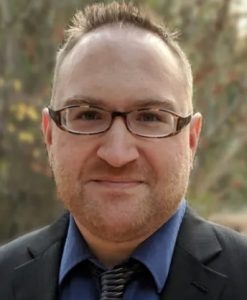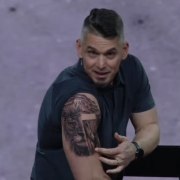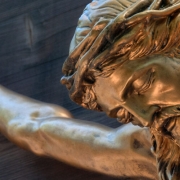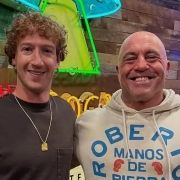What can we learn from children about being liberated from Kendomland?
This article originally appeared at Baptist News Global on April 30, 2024.
April 2024 has been the month when the Kens of the Mojo Dojo Casa Churches came out in full force to flex their patriarchy power in preach-offs.
It started with Josh Howerton telling women to crown dishonorable men as their kings and telling women to stand, wear and do whatever their husbands tell them on their wedding night. Then Howerton claimed it was a joke and gave a joke of a plagiarized apology that promoted male power.
Amidst these controversies, Howerton attended the Stronger Men’s Conference, which features men smashing cars with tanks, shooting fake machine guns, smashing chairs over each other’s heads while dressed up in superhero costumes and confronting one another from the pulpit.
In the weeks since their epic preach-off, the controversy has continued as Mark Driscoll and John Lindell took their fight online to the point where women who work at Lindell’s church are reportedly receiving death threats over it.

Rick Pidcock
While much has been written about these men posturing themselves over women and one another, many who are criticizing these men have said they are acting like children.
As a stay-at-home father of five kids, I know how unbearable it may seem when kids are fighting with one another or trying to one-up the other. But it’s important for us to remember in critiquing patriarchal men that we must refrain from using metaphors that belittle children.
Jesus said, “Unless you are converted and become like children, you will not enter the kingdom of heaven. Whoever then humbles himself as this child, he is the greatest in the kingdom of heaven.”
According to Jesus, those who are positioning themselves as the greatest are not acting like children. Instead, they should convert. And in Jesus’ mind, conversion isn’t submitting to a sacralized power dynamic but is being humble enough to reject the hierarchy of greatness and to become like children.
“Acting like children is not the problem. But becoming like children is the solution.”
Thus, acting like children is not the problem. But becoming like children is the solution.
This means liberation from hierarchy can be learned from children. So to learn more about how children bring liberation from the Kens of Kendomland, I interviewed child liberationist theologian R.L. Stollar about his new book, The Kingdom of Children: A Liberation Theology.
Rick Pidcock: I love how you refer to Jesus as “God the Child.” How does child liberation theology help us experience a relationship with God the Child through our relationships with children?
R.L. Stollar: Liberation theology in general, and not just child liberation theology, argues that salvation is inherently contextual and relational. What this means is that we live out our salvation in our everyday lives by how we treat and relate to the people around us, especially marginalized people.

R.L. Stollar
Liberation theologians often point to the striking passage in the Christian Gospels, Matthew 25:31-46, where Jesus says he will one day separate people into two groups with different eternal destinations: sheep and goats. The sheep are those who take care of people in need whereas the goats are those who ignore people in need.
Most interestingly, Jesus says those who take care of people in need are taking care of Jesus, too, even if they do not know it: “The truth is, anything you did for any of my people here, you also did for me.”
Jesus said this because he knew he would not always be here with us in the flesh. But we do have images of Jesus — images of God — all around us in our fellow human beings, most especially children, whom Jesus highlights as especially important for us to prioritize and protect.
So how we treat and relate to children (as well as other marginalized groups) is a barometer of how we would treat and relate to Jesus. By either protecting or abusing children, we are either protecting or abusing Jesus as well.










Leave a Reply
Want to join the discussion?Feel free to contribute!